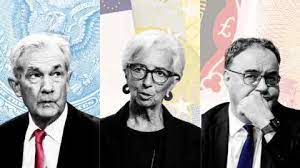The war in Ukraine has tended to increase uncertainty regarding inflation and growth prospects. When and with what consequences this war will end is pure speculation, but capital markets are expected to build a certain immunity to the headline risks in the coming weeks. The medium- to long-term consequences, on the other hand, could be significant. It is possible that we are at the beginning of a new bloc formation or a new Cold War. This would put a significant damper on globalization and further fuel higher structural inflation.
US equities closed modestly lower on Tuesday as investors awaited today’s conclusion of the Federal Open Market Committee meeting. The Fed is widely expected to hike the target for its federal funds rate by another 75 basis points. The Dow Jones Industrial Average decreased by 0.2%, the S&P 500 fell 0.4%, and the Nasdaq Composite was down 0.9%. Meanwhile, European markets were mostly higher in the wake of mixed manufacturing data, with the Euro Stoxx 50 index up almost 1%.
Summary
- Asian equities were modestly higher in cautious trading on Wednesday, with the Hang Seng index once again leading the gains in the region, after reports about a potential end to China’s Covid-zero policy. Defence-related shares listed in South Korea and Japan jumped after military authorities in Seoul confirmed North Korea fired more than 10 types of missiles off its eastern coast.
- European and US equity futures are poised for a modest advance as investors await the Fed’s key policy decision late in the day.
- Oil prices rose this morning to extend gains from the previous session after an industry report pointed to a big drawdown in US crude inventories, signalling that demand remains solid despite global growth concerns.
- The October ISM Manufacturing Index showed that US manufacturing activity fell but remained in expansion territory. The index declined to 50.2 from the prior month’s unrevised 50.9 reading—its lowest level since May 2020—and versus the estimate calling for a reading of 50.0.
- The US Labour Department’s Job Opening and Labour Turnover Survey (JOLTS), a measure of unmet demand for labour, showed an unexpected increase to 10.7 million jobs available to be filled in September, well above estimates of 10.0 million, and versus August’s upwardly revised level of 10.3 million.
- Pfizer reported Q3 EPS of $1.78, above estimates of $1.39, as revenues declined 6% year-over-year (y/y) to $22.64 billion, versus the expected $21.07 billion. The company raised the range of its full-year EPS and revenue guidance despite the unfavourable impacts from foreign exchange.
- Airbnb forecast fourth-quarter revenue below market estimates on Tuesday, saying a strong US dollar had started to pressure its business and that bookings would moderate after a bumper third quarter. The company’s third quarter net profit rose 45.6% to $1.21 billion, or $1.79 per share, while revenue increased 28.9% to $2.88 billion, beating estimates of $2.84 billion.
- Eli Lilly and Company announced Q3 EPS of $1.98, north of the forecasted $1.91, as revenues rose 2% y/y to $6.94 billion, well above the expected $6.89 billion. The increase in worldwide revenue was driven by a 14% increase in volume, which was partially offset by a 7% decrease as a result of lower realised prices, along with a 4% decrease from the impact of foreign exchange rates. The company reduced its EPS guidance and lowered its revenue range outlook by $300 million.
- Twitter Inc will start charging $8 for its Blue service, which includes its sought-after “verified” badge, new boss Elon Musk said on Tuesday, in his push to monetise the service and make the social media network less reliant on ads.
- Credit Suisse’s long-term rating was downgraded by S&P, underscoring the challenges of achieving a turnaround after the bank laid out a radical restructuring plan last week. The rating agency cut the long-term rating to BBB- from BBB, with a stable outlook.






